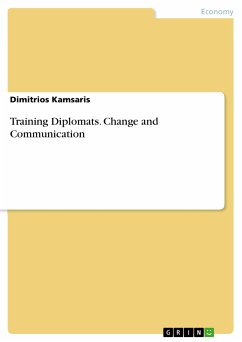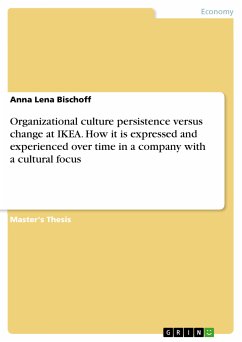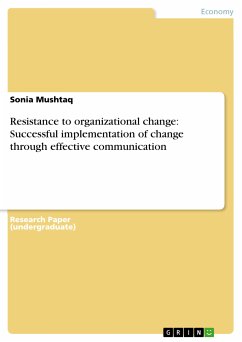Document from the year 2014 in the subject Business economics - Business Management, Corporate Governance, Euro-Business-College Bielefeld, language: English, abstract: At the present diverse days, globalization, technological revolution, economic changes and competition, create pressure on all organizations, both in private and public sector, requesting them to adapt quickly to a new changing environment. Since 1990s we observe an increased in interest in culture of international relations. In a rapidly changing diplomatic environment, countries and organizations are facing numerous challenges leading to reformation. The main question is whether diplomats are ready and willing to accept or resist to this change. Resistance to change reconciles attitudes performed by change recipients, in order to delay or discontinue organizational change. The intention of this book is to explore the diplomats' resistance to organizational and environmental changes in the Diplomatic Corps, by examining the resistance reasons, and the consequences on the decision-making process related to the change. The findings will contribute to better understanding of diplomat's reactions towards changes and may be used to promote an essential dialogue in order to overcome resistance. Globalization requires governments to operate in a context different from before, which is to integrate other participants of diplomacy in its own decision-making processes. Governments have been focusing on new strategies, such as involving ministries and non-state actors and institutions, providing greater transparency, and acting collectively as often as possible. Undeniably, training stands at the top of organizational priorities. Many organizations believe that to survive, in this increasingly demanding world, they must effectively and efficiently utilize their most valuable asset, their diplomats' skills. Thus, a good training program is crucial to their success. The training literature underlines the organizational and individual benefits to be gained from adopting a systematic approach to training, while the human resource development trend is to guarantee, through continuous development strategies, a continuous improvement culture. Training is an issue which its significance is well recognized by the management, the trade unions, and the governments. The growing interest in training arises by the belief that the skill level of the workforce can importantly impact performance and competitiveness, and that developing management and workforce competence is essential for organizational success.
Dieser Download kann aus rechtlichen Gründen nur mit Rechnungsadresse in A, B, BG, CY, CZ, D, DK, EW, E, FIN, F, GR, HR, H, IRL, I, LT, L, LR, M, NL, PL, P, R, S, SLO, SK ausgeliefert werden.









